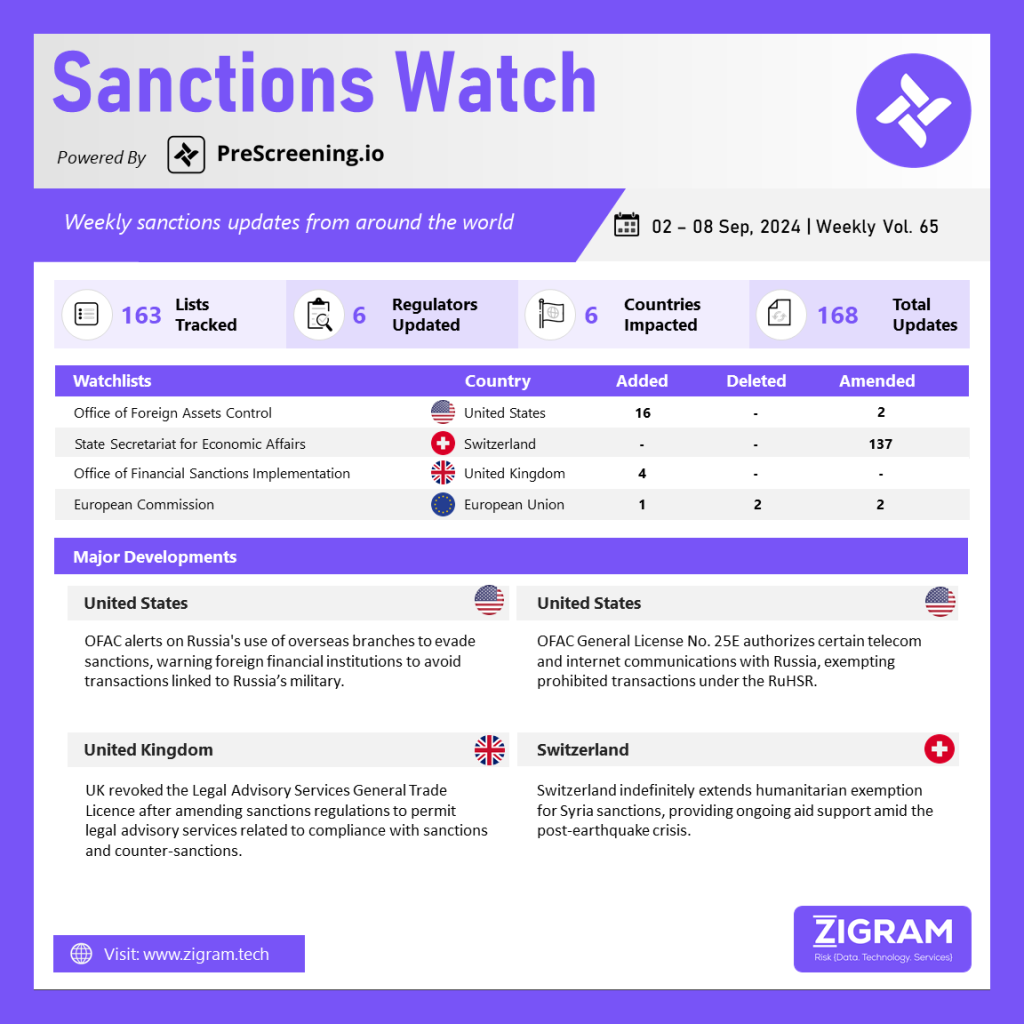Sanctions Watch Vol 65
In the latest edition of our Sanctions Watch weekly digest, we pressent significant updates on sanction watchlists and regulatory developments.
1. OFAC Warns Of Russia’s Evasion Of Sanctions Through New Financial Institutions Abroad
The Office of Foreign Assets Control (OFAC) has issued a warning to foreign jurisdictions and financial institutions about Russia’s efforts to bypass sanctions by opening new branches and subsidiaries of its financial institutions abroad. Despite previous guidance on this issue, Russia is increasingly using third countries to evade sanctions and support its military-industrial base. OFAC emphasizes that Russia is realigning its economy and resources to bolster its war efforts, utilizing its financial institutions to do so.
The Treasury Department has various tools under its sanctions and Bank Secrecy Act authorities to counter these attempts. Foreign regulators and financial institutions should scrutinize any new branches or subsidiaries of Russian financial institutions, as these may indicate attempts to evade sanctions. While transactions related to essential goods and services remain authorized, dealings with these new entities pose significant risks and should be approached with caution.
2. OFAC Issues General License No. 25e For Telecommunications And Internet Communications Involving Russia
The Office of Foreign Assets Control (OFAC) issued General License No. 25E, authorizing transactions related to telecommunications and certain internet-based communications involving Russia, under the Russian Harmful Foreign Activities Sanctions Regulations (31 CFR part 587). This license permits transactions necessary for telecommunications with Russia, including services such as email, instant messaging and social media, as well as the export of software, hardware and technology related to Internet communications.
However, the license does not allow transactions involving Russian financial institutions under specific Executive Orders (E.O. 14024, 14066 and 14068) or certain Russian media and entities. This new license, effective September 4, 2024, replaces General License No. 25D and compliance with other federal laws and export regulations remains required.
3. Amendments To Russia Sanctions Regulations 2024: Legal Advisory Services Now Permitted For Global Sanctions And Compliance
Russia (Sanctions) (EU Exit) (Amendment) (No.4) Regulations 2024, effective from 6 September 2024, modify the Russia (Sanctions) (EU Exit) Regulations 2019. Notably, the amendment to regulation 60DB clarifies that legal advisory services, previously restricted by regulation 54D, are now allowed when dealing with global sanctions, Russian counter-sanctions and global criminal law. This update also permits legal advisory services concerning punitive measures and compliance with UK statutory or regulatory obligations.
Consequently, the Legal Advisory Services General Trade License, established to facilitate certain legal services, has been revoked as of 6 September 2024. However, Regulation 76’s record-keeping requirements still apply, necessitating the retention of records for four years beyond their creation and allowing inspection by authorized personnel. For additional guidance on Russian sanctions and licensing, visit the Russia sanctions: guidance page or contact the DBT’s Import Licensing Branch. The Export Support Service is available for other export-related inquiries.
4. Switzerland Extends Humanitarian Exemption To Sanctions Against Syria Indefinitely, Aligning With EU’s Approach
On September 4, 2024, Switzerland’s Federal Council decided to extend the humanitarian exemption to its sanctions against Syria indefinitely. This exemption, initially introduced temporarily after the February 2023 earthquake, was designed to facilitate humanitarian efforts by international organizations and certain actors affected by the crisis.
Following the EU’s lead, which had extended its own exemption twice since its introduction on February 23, 2023, Switzerland included the EU’s temporary measure in its ordinance on Syria sanctions on March 10, 2023, initially for six months and subsequently extended twice. By extending the exemption indefinitely, Switzerland provides humanitarian actors with greater stability and predictability. The Federal Council first imposed sanctions on Syria on May 18, 2011, aligning with the EU’s sanctions regime established earlier that month and has since adapted its measures in line with EU decisions.
Know more about the product: PreScreening.io
Click here to book a free demo.
Sanctions Watch is a weekly recap of events and news related to sanctions around the world.
- #OfficeofForeignAssetsControl
- #ForeignJurisdictions
- #FinancialInstitutions
- #Russia
- #EvadeSanctions
- #BankSecrecyAct
- #GeneralLicense
- #Telecommunications
- #Internet
- #HarmfulForeignActivities
- #ExportRegulations
- #CriminalLaw
- #TradeLicense
- #Switzerland
- #SanctionsWatch
- #InternationalSanctions
- #EconomicSanctions
- #RegulatoryCompliance
- #TradeCompliance
- #SanctionsEnforcement
- #SanctionsViolations
- #FinancialCrime
- #HumanitarianExemption
- #Syria
